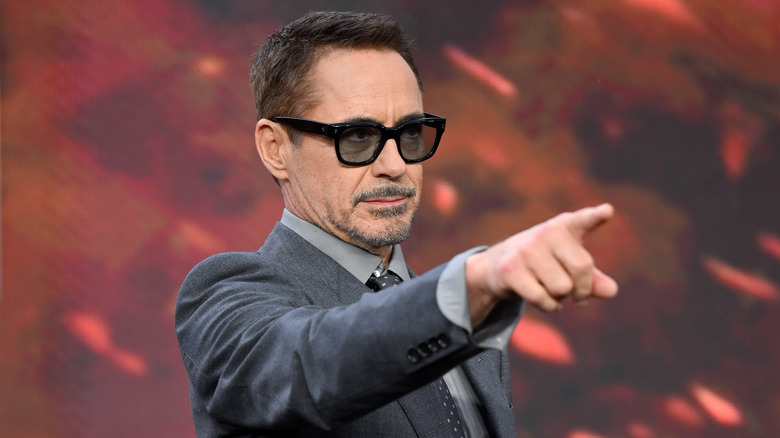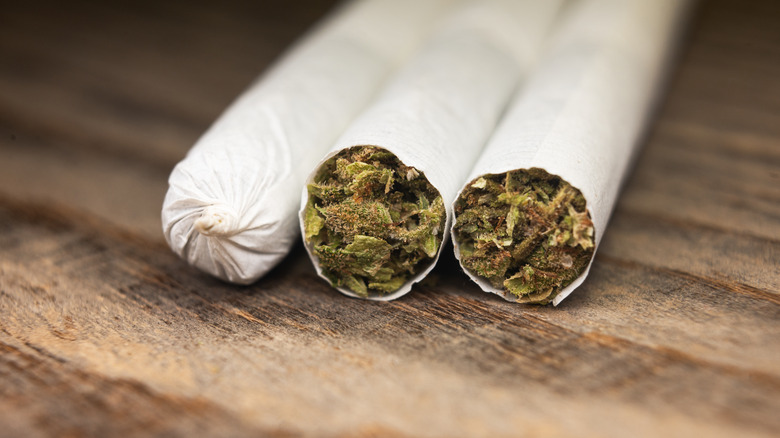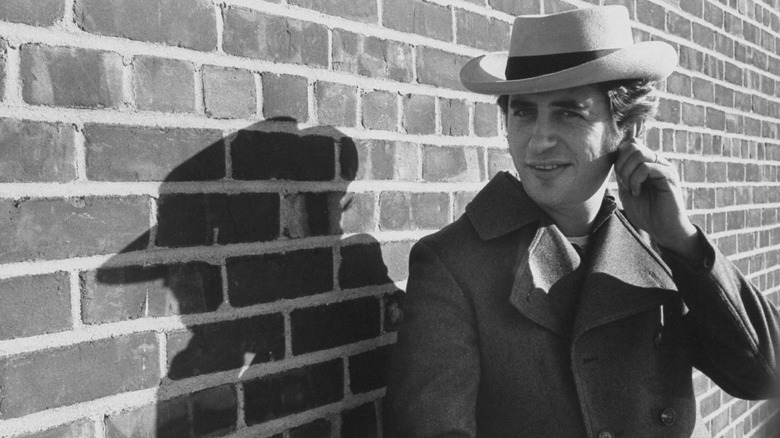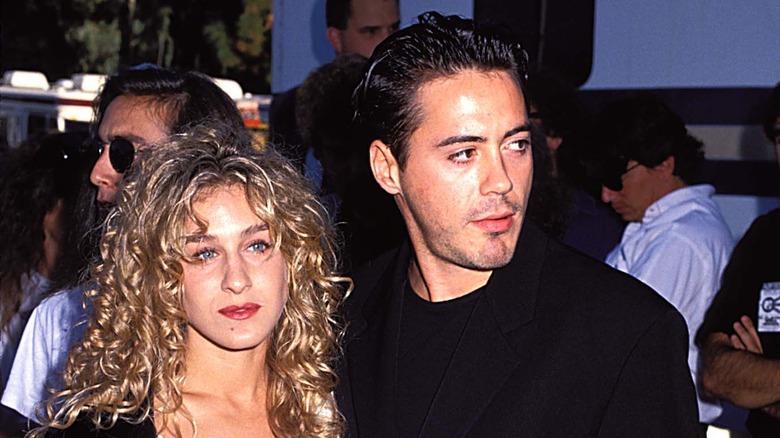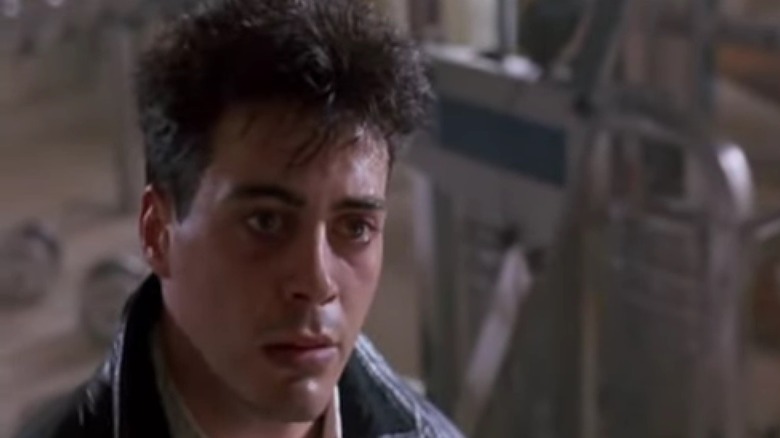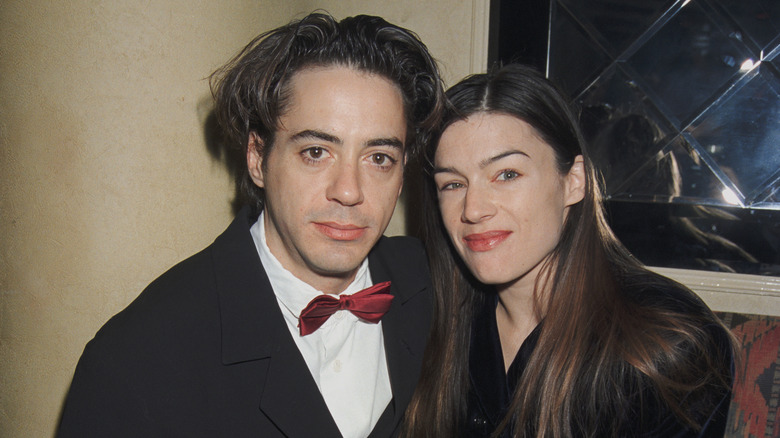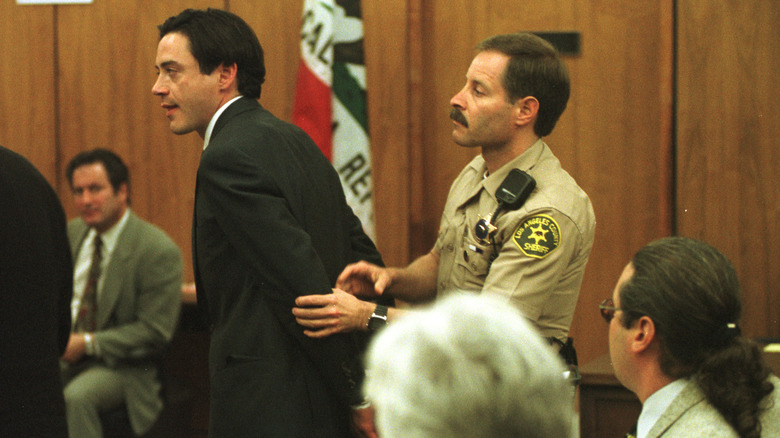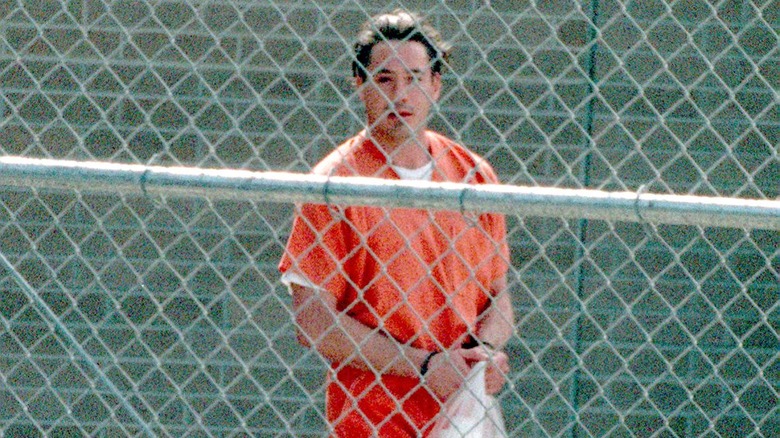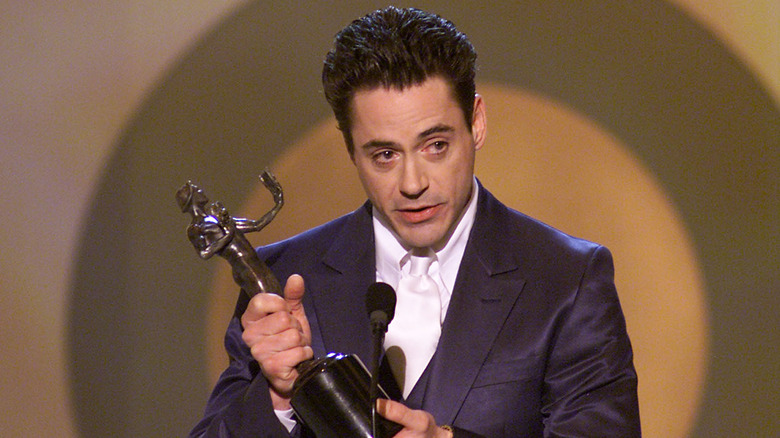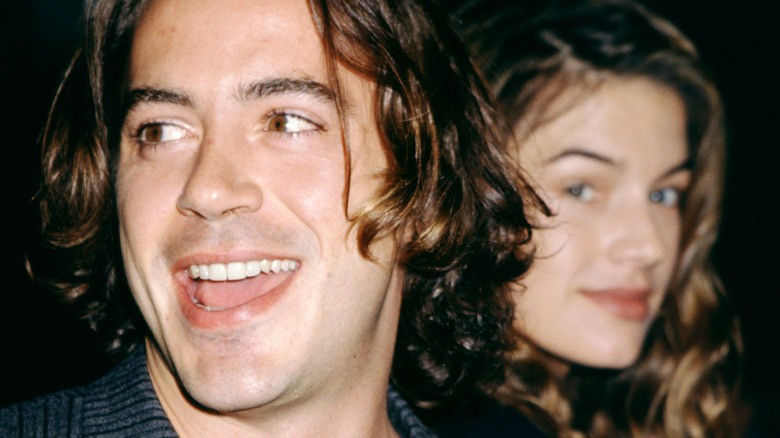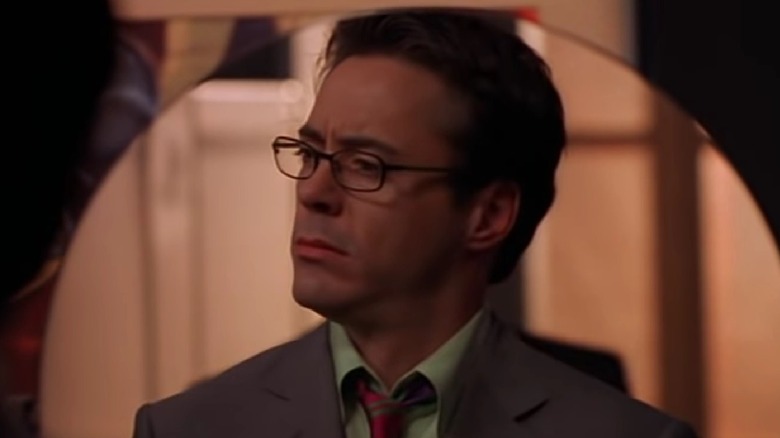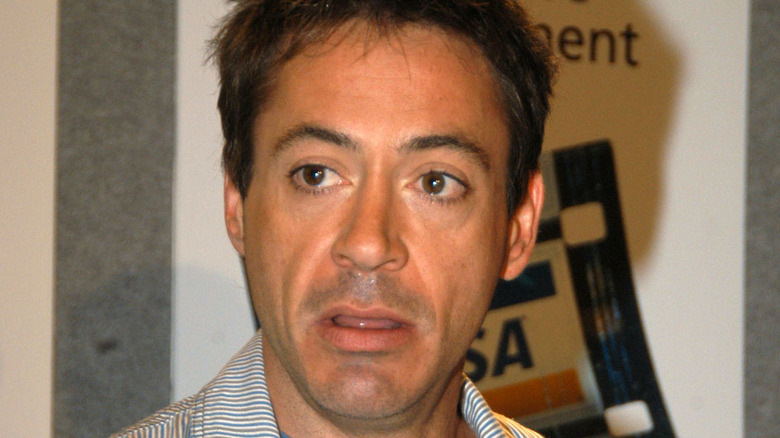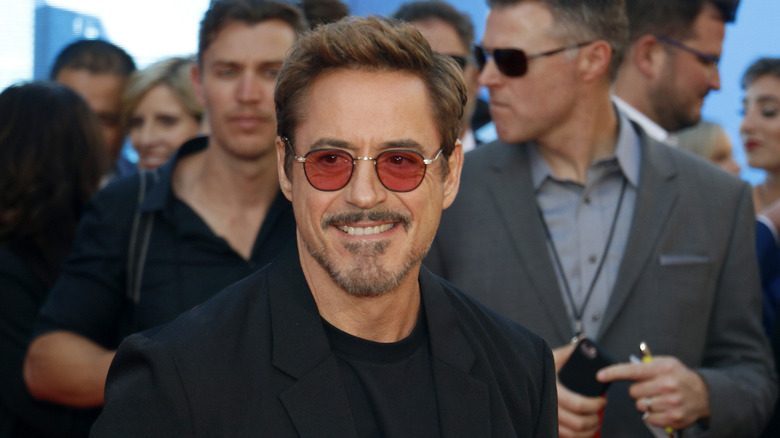Robert Downey Jr.'s Tragic Real-Life Story
Plenty of celebrities have had their share of ups and downs, but perhaps none have experienced higher highs or lower lows than the great Robert Downey Jr. The son of avant-garde filmmaker Robert Downey Sr., Downey has been in the public eye seemingly forever; as a young man in the '80s, he experienced a precipitous rise to fame due to the fact that even then, he absolutely radiated charisma and talent. After becoming a critical darling and flirting with the A-list in the early '90s, Downey's personal and professional life unexpectedly, and shockingly, cratered — thanks to a massive, terribly persistent issue with drugs and alcohol that took him over a decade to fully overcome.
As you may be aware, overcome it he did. In 2008, not in spite of his checkered past but because of it, he landed the role of the similarly troubled genius, playboy, billionaire philanthropist Tony Stark in the very first entry into the Marvel Cinematic Universe, "Iron Man." Just four years later, he would be the highest-paid actor in the world, a title he held for several years afterward. Speaking with Vanity Fair in 2023, his wife Susan Downey said, "He's been through a lot of scenarios, both in life and in work, and has survived a lot ... All of the stuff that made him wonderful and weird when I met him, and made him someone unlike anyone I've ever known, is still who he is today."
Robert Downey Jr. first did drugs at an extremely young age
Avant-garde filmmakers are not generally known to be the most pragmatic, level-headed people, and Robert Downey Sr. was no exception. Robert Downey Jr. has often mentioned the fact that his father introduced him to drugs, specifically marijuana, at an extremely young age — the recollections of both men vary as to whether that age was 8 years old or 6, but it goes without saying that either is wildly inappropriate. In a profile in the 1988 book "The New Breed," a collection of essays on the hot, up-and-coming actors of that time, Downey — then only 23 years old — related how being raised around a culture of open drug use had already begun to shape his life.
"It's so much easier to spend every night out getting drunk with the boys and making a thousand phone calls in pursuit of drugs than to stop and say, 'OK, what am I going to do tomorrow when I wake up late, and it all just starts over again?'" he said. "Now, I'm into sobriety by default." Of course, that was almost certainly not true at that time, and would prove to ring extremely hollow in the years to come. For Downey Sr.'s part, he openly expressed regret for his actions in the 2022 documentary "Sr.," in which he was interviewed on a variety of subjects by his son: "It was an idiot move on our parts, a lot of us, to share that with our children," he said.
His relationship with his father was complicated
Of course, including his son in his wild lifestyle wasn't a one-and-done thing for Robert Downey Sr., and this included more than just drugs. Robert Downey Jr. appeared in some of his father's films from the age of 5, and these were decidedly not childrens' films; his first appearance onscreen came in 1970's "Pound," in which desperate animals in a shelter are all portrayed in live-action by human actors, and in 1972's "Greaser's Palace," which improbably adapted Biblical stories to a Wild West setting, 7-year-old Robert Downey Jr. was ... well, murdered by God. In a 1992 piece by The New York Times, Downey Sr. said of that role, "It could have been too much to expose him to. It was traumatic for him to see that kind of violence."
In "The New Breed," Downey described the chaos of living with his father, and how being placed into inappropriately adult situations was, in a weird way, a means for the two to bond. And to The New York Times, he reflected on how this had shaped him as an adult. "If my father were less of a pioneer, he probably would have been more of a father, but I wouldn't be who I [am]," he said. "I think it's valiant to make mistakes so your children don't have to."
The Hollywood romance that failed
Robert Downey Jr. was filming only his second credited feature, the 1984 thriller "First Born," when he became involved with one of his lovely and talented co-stars — Sarah Jessica Parker, who would go on to success and acclaim as the star of features like "Hocus Pocus" and the iconic TV series "Sex and the City." The pair quickly began dating, and in a 1985 piece for People magazine, even Robert Downey Sr. noted that the young actress had a profound influence on his son, saying, "Without her, Robert would go at 100 miles an hour into a brick wall. They're very sweet together. He might become a gentleman as a result of this."
Downey and Parker were virtually inseparable throughout the '80s, but in 1991, she ended the relationship — and in a 2008 piece for Parade magazine (via HuffPost), Downey was quite clear as to why. "I was so selfish. I liked to drink, and I had a drug problem, and that didn't jibe with Sarah Jessica, because it is the furthest thing from what she is," he explained. "She provided me a home and understanding. She tried to help me."
In 2015, during an appearance on Howard Stern's SiriusXM show, Downey shared that he had finally had a chance to catch up with his old flame during a trip to New York. "We were able to spend some time together and it was really cool," he said. "I got to meet her kids and I saw the way she and [Broderick] live, and I respect both of them so much" (via People).
His character in Less Than Zero hit uncomfortably close to home
The role that made critics sit up and take notice of Robert Downey Jr. came in director Marek Kanievska's "Less Than Zero," the 1987 adaptation of the Bret Easton Ellis novel in which he portrayed Julian, the drug-addicted best friend of Andrew McCarthy's protagonist, Clay. For Downey, the role was suited to him in unfortunate ways, and in a 2003 piece for The Guardian, he cited the film as the point at which his personal drug issues began to snowball out of control. "Until that movie, I took my drugs after work and on the weekends," he said. "That changed on 'Less Than Zero' ... The character was an exaggeration of myself. Then things changed and, in some ways, I became an exaggeration of the character."
Perhaps tragically, Downey would later say that Kanievska understood the similarities between Downey and Julian, and pinned his hopes to the role being a cathartic experience for the actor — hopes that, obviously, failed to pan out.
Speaking with The New York Times in 2023, Downey spoke philosophically about the situation. "Kanievska ... understood what I didn't, which is, we're doing something incredibly artistic: This guy is a mess and probably going to get worse, but he's not as bad as the character he's playing," he said. "Can he have an experience whereby it may spare him years of untold agony? The answer was no, but it was a question worth asking."
Back-to-back arrests jeopardized his career
Despite his issues, Robert Downey Jr.'s star continued to rise in the '90s. With the 1992 biopic "Chaplin," in which he appeared in the title role of legendary film titan Charlie Chaplin, Downey received his first Oscar nomination; over the next few years, he turned up in well-received roles in several critically lauded projects, such as Robert Altman's "Short Cuts," Oliver Stone's "Natural Born Killers," and Norman Jewison's "Only You." In 1996, though, it all began to come crashing down — and it started with an arrest for infractions of the type usually reserved for out-of-control rock stars.
In June of that year, Downey was pulled over for speeding in Malibu, and was found to be under the influence of drugs; in the car were felony amounts of cocaine and heroin, not to mention an unloaded .357 magnum revolver. Downey was arraigned on possession, DUI, and gun charges — but before the case could be resolved, he was arrested again in a bizarre incident that made for some sensational headlines.
Early in the morning on the literal day after his arraignment, he was taken into custody after mistakenly wandering into a neighbor's home; once again under the influence, he had believed it to be his own. He had then fallen soundly asleep in the bed of said neighbor's 11-year-old son. Speaking with the Los Angeles Times at that time, an anonymous agent at Downey's former agency said, "Two drug arrests in a row? Yes, this can seriously damage your future in this town."
Drug testing and jail failed to straighten him out
Following arrests for drug-related charges in 1996, Robert Downey Jr. was able to avoid jail, at least initially; he was sentenced to three years' probation, spent several months in an inpatient treatment program, and was ordered to undergo random drug testing. In October 1997, though, his probation was revoked after he was found to have used drugs again — and at that time, the judge in his probation revocation hearing, Lawrence Mira, was disinclined to give him a second chance to voluntarily stay clean. "I'm going to incarcerate you, and I'm going to incarcerate you in a way that's very unpleasant for you," Mira told him. "I don't care who you are. What I care about is that there is a life to be saved from drugs" (via Los Angeles Times). Mira sentenced Downey to six months in the Los Angeles County Jail.
The troubled actor served his sentence, and continued to work after his release, landing roles in such films as James Toback's "Two Girls and a Guy" and "The Fugitive" sequel "U.S. Marshals." Unfortunately, though, his experience in the county clink was not enough to deter him from falling back into his old ways. In 1999, Downey again violated probation by misusing drugs.
Downey was finally slapped with a three-year prison term
After this latest violation, Robert Downey Jr. had the distinct misfortune of again appearing in front of Judge Lawrence Mira, to whom he made an impassioned plea. Backed by legendary attorney Robert Shapiro, who had assembled the same team which had successfully defended O.J. Simpson in his murder trial five years earlier, Downey laid it out for Mira, comparing his compulsion to use drugs to a death wish: "It's like I've got a shotgun in my mouth, with my finger on the trigger," he said, "and I like the taste of the gun metal." Mira, who had heard quite similar words from the actor in the not-too-distant past, was somewhat sympathetic — but not swayed.
"Is there any question that if this defendant continues to use drugs we're going to be reading his name in an obituary?" Mira asked the actor's attorneys, rhetorically. "We tried rehabilitation and it simply hasn't worked ... I don't think we have any alternative [to a prison sentence]. We have used them all." With that, Mira handed down his sentence: three years, not in the county lockup, but in state prison.
Due to time previously served in jail and on parole, he ultimately spent a little over a year in North Kern State Prison in Delano, California; he would later tell The Hollywood Reporter that the facility was "arguably the most dangerous place I've ever been in my life."
His comeback role came at his lowest point
Upon his release from prison in 2000, it took Robert Downey Jr. all of about a week to find his next acting gig. The David E. Kelley dramedy series "Ally McBeal," starring Calista Flockhart, had been a smash hit after debuting in 1997, but by its third season, it was beginning to lose steam. Enter Downey, who accepted the role of Larry Paul, a new love interest for Flockhart's relationship-challenged attorney; the actor made his debut in the first episode of the fourth season. The series' ratings immediately spiked, and it looked like Downey might be on the comeback trail — but the actor would later say that during this time, he was on nothing resembling the straight and narrow.
In the 2003 sit-down with The Guardian, Downey seemed downright perplexed by how well-received his turn on the series was. "Funny isn't it? For some people, that's the litmus. Will he ever be as good again as he was on Ally McBeal?" he said. "You put a Hugo Boss suit on a guy, clean him up a little, feed him his lines and he manages to perform ... I'm probably not the best person to ask about that period. It was my lowest point in terms of addictions. At that stage, I didn't give a f*** whether I ever acted again."
Downey's wife Deborah Falconer finally lets go
Shortly after Robert Downey Jr. made his "Ally McBeal" debut, he was dealt a blow that had been a long time coming. The actor had married model and actress Deborah Falconer in 1992, and the following year, she had given birth to their son, Indio. While Falconer had done her best to support her troubled husband during the early years of their marriage, the multiple arrests and incarcerations had taken their toll; the pair had been separated since 1996, and in January 2001, Falconer finally threw in the towel and filed for divorce.
While Falconer has never publicly discussed what the final straw might have been, it was speculated at the time that Downey may have grown just a bit too close to his co-star Calista Flockhart, whom he was seen cozying up to at the 2000 Golden Globe Awards, for her comfort. (Accepting a trophy for Best Supporting Television Actor that night, he had raised it aloft and shouted to Flockhart in the audience, "Sweetheart, this is ours!") Of course, it also might have had something to do with the fact that the previous November, Downey had (wait for it) gotten himself arrested ... again.
He was dropped from Ally McBeal after yet another run-in with the law
Close to Thanksgiving in November 2000, Robert Downey Jr. had been picked up for drug possession in Palm Springs, California, just a month after the premiere of "Ally McBeal" Season 4. He had pleaded innocent the following month, and the executives at Fox behind "Ally" publicly expressed their confidence in their new star by signing him on for the rest of the season. Then, in April 2001 — just months after Deborah Falconer's divorce filing — the actor was arrested wandering the streets of Culver City, California, late one night, once again under the influence of drugs. His publicist issued an extremely brief statement announcing that Downey had once again checked himself into rehab, and this time, Fox execs were not so forgiving.
It was immediately announced that Downey was, at the very least, done for the season ("We are wrapping up the stories on the final few episodes of 'Ally McBeal' for the season without him," David E. Kelley told the Los Angeles Times). The following month, producer Bill D'Elia told Entertainment Weekly that Downey had not technically been fired, but that the series' creative team was looking at making some unspecified cast changes for the following season — a season in which, ultimately, Downey did not appear.
His true comeback was never a sure thing
In October 2003, Robert Downey Jr. was the focus of an article in The New York Times titled "The Sobering Life of Robert Downey Jr." In the piece, it was noted that Downey was free of all legal encumbrances — as in, he was not on parole, or probation, or in a court-enforced rehab program — for the first time in seven years.
However, although he was preparing to make a comeback in the lead role in the 2003 film "The Singing Detective," he was very much living the life of a recovering addict — staying rent-free in a run-down house owned by his friend, composer Jonathan Elias; getting into new, healthier diversions, including Wing Chun kung-fu and yoga; and submitting to drug tests not for the court, but for his ex-wife Deborah Falconer, so that he could continue to spend time with his son Indio, who by that time was 10 years old.
Of course, his self-deprecating wit was on full display when asked about his mindset towards his newfound sobriety. "I guess sometimes I want to have a drink with dinner," he said. "But then I remember that I have plans for Christmas." The piece was a portrait of a man very much walking a razor's edge between his old, self-destructive life and the new life that beckoned him, one that would finally allow him to fulfill his vast potential — and while we now know how that turned out, at just a few months into sobriety, it was by no means a sure thing.
Downey is still associated with his drug problems despite his resurgence
If there is one thing that the world at large is likely to remember Robert Downey Jr. for, it's for inhabiting the role of Tony Stark, the invincible Iron Man, across eight films for 11 years. It was truly the role he was born to play, and the character's arc over that ridiculously long period — from arrogant, self-centered weapons dealer to self-sacrificing savior of the entire universe — is one that could only have been convincingly pulled off by an actor of Downey's caliber. But if there is one other thing he is almost certain to be forever associated with, it is — most unfortunately — his seemingly endless struggles with addiction.
Downey himself is understandably through discussing those challenges, as far as they are in his rearview mirror. In 2015, he famously walked out of an interview with Krishnan Guru-Murthy when the British interviewer disregarded requests to stay off that particular topic. Explaining why he did so to Howard Stern on his SiriusXM show (via The Hollywood Reporter), Downey was characteristically blunt, saying, "The assumption is that there's a button that because you've sat down there, you're going to be scrutinized ... What I have to do in the future is I just have to give myself permission to say, 'That is more than likely a syphilitic parasite, and I need to distance myself from this clown.'"
"Otherwise," he said, "I'm probably going to put hands on somebody, and then there's a real story."
If you or anyone you know needs help with addiction issues, help is available. Visit the Substance Abuse and Mental Health Services Administration website or contact SAMHSA's National Helpline at 1-800-662-HELP (4357).
